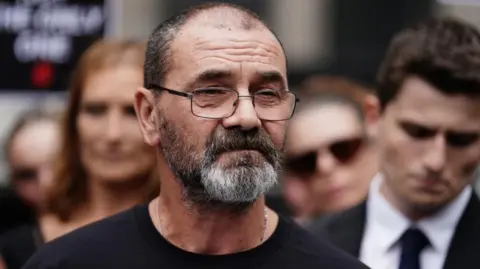Higher cap for payouts to wrongly jailed is insulting, says Malkinson
 PA Media
PA MediaAndrew Malkinson, who spent 17 years in prison for a crime he did not commit, has described the government's increased cap on payouts for victims of miscarriages of justice as "insulting".
The Ministry of Justice (MoJ) said the maximum amount will be raised in England and Wales for the first time since 2008, from £1m to £1.3m, to ensure those wrongly convicted and imprisoned are compensated for "the years they cannot get back".
It follows calls to lift the cap, including from Mr Malkinson who has been campaigning to get the compensation scheme overhauled.
Reacting to the uplift, legal charity Appeal, which represented him, argued the increase "falls far short of matching inflation".
On Tuesday, the government said the cap would be raised by 30%.
This would bring the limit on compensation for people who have been in jail for 10 years or more to £1.3m, and £650,000 for up to a decade.
Mr Malkinson said the cap increase is "an improvement" but that "a below-inflation increase is insulting".
"The state stole years of my life and robbed me of my physical and mental health, yet it still wants to arbitrarily limit the compensation I receive to try to put myself back together," he said in a statement.
"I'll keep fighting to abolish this cruel and arbitrary cap, along with the brutal rules currently denying compensation to the vast majority of wrongfully convicted people."
In February, he received an initial payment from the government. The amount of compensation was not revealed, but The Guardian reported he would receive a "significant" six-figure sum as an interim payment.
On Tuesday, the MoJ said the increase would create "a fairer and better justice system".
Justice Secretary Shabana Mahmood said: "Fairness is the ideal that underpins our justice system. Where it has failed to meet that ideal, victims of devastating miscarriages of justice must be able to rebuild their lives.
"This uplift will ensure victims are compensated for the crimes they did not commit and the years they cannot get back."
Once eligible, the level of compensation will be decided by an independent assessor.
Investigator James Burley, who led Appeal's investigation into Mr Malkinson's case, said: "This is a step forward, but the increase falls far short of matching inflation since the cap's introduction in 2008.
"Wrongful conviction survivors like Andrew Malkinson have endured unimaginable pain. The compensation they receive to rebuild their lives should reflect that reality, not be limited by an arbitrary cap."
